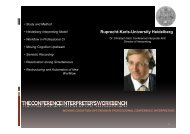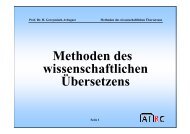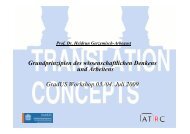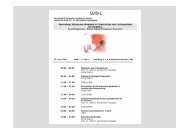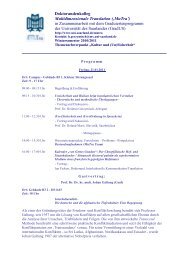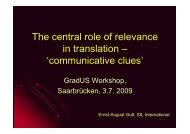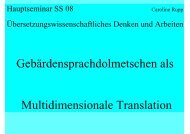Proceedings - Translation Concepts
Proceedings - Translation Concepts
Proceedings - Translation Concepts
You also want an ePaper? Increase the reach of your titles
YUMPU automatically turns print PDFs into web optimized ePapers that Google loves.
MuTra 2005 – Challenges of Multidimensional <strong>Translation</strong>: Conference <strong>Proceedings</strong><br />
Nilgin Tanis Polat<br />
2 The concept of ‘Cultural Leeway’<br />
Cultural leeway is the ’variation field’ for the translator when translating cultural phenomena<br />
from source to target texts in order to achieve covert translation equivalence on a lexical,<br />
semantic and pragmatic level.<br />
We will illustrate the concept of cultural leeway by the following examples from the<br />
German novel Die Blechtrommel published by Günter Grass, and its translation and the<br />
Turkish novel Yer Demir Gök Bakır by Yaşar Kemal. Die Blechtrommel was published under<br />
the name Teneke Trampet (Cem Yayınevi, 1983) by Kâmuran Şipal for the Turkish readers.<br />
The novel, Yer Demir Gök Bakır is translated for the German readers by Cornelius Bischoff<br />
under the name Eisenerde, Kupferhimmel (Unionsverlag, 1986). Both narrative texts are<br />
published in several editions in the source language and in the target language and have thus<br />
reached a large number of readers. The texts are compared using as tertium comparations the<br />
categories ‘personalization’, ‘emotionalization’ ‘routine formulae’, ‘addressee orientation’, as<br />
well as ‘non-verbal’ gestures and their descriptions. For reasons of space, these categories,<br />
which are similar to Juliane House’s discourse preferences established for German-English<br />
comparisons (1996, 1999) are not explicated here but are discussed together with their<br />
German-Turkish examples.<br />
3 Examples<br />
3.1 Addressee Orientation<br />
In Yer Demir Gök Bakır, the narrator tends to address the reader directly, whereas in its<br />
German translation the agent is deleted as follows:<br />
Đşte bu dünyanın aklığına Çukurova güneşi gibi bir de belalı güneş vurmuş, karların üstüne<br />
öylesine bir de ipilti çökmüş, göz açıp da bakamazsın. (Kemal 1980 :5)<br />
Und auf diese weiße Welt scheint zu allem Überfluß die Sonne so hell, wie sie nur in der<br />
Çukurova-Ebene scheint, die Schneedecke glitzert so grell, daß man die Augen nicht offen halten<br />
kann. (Kemal 1992:5)<br />
“Göz açıp bakamazsın” is translated word for word in the Turkish version as you cannot keep<br />
your eyes open. The Turkish narrator takes the perspective of addressing the reader here,<br />
whereas in the German translation the impersonal form, “man” is preferred. The German<br />
translator decides on the impersonal form frequently as part of his ‘cultural leeway’. On the<br />
contrary, an excerpt from the Blechtrommel:<br />
Man kann eine Geschichte in der Mitte beginnen und vorwärts wie rückwärts kühn ausschreitend<br />
Verwirrung anstiften. Man kann sich modern geben, alle Zeiten, Entfernungen wegstreichen und<br />
hinterher verkünden oder verkünden lassen, man habe endlich und in letzter Stunde das Raum-<br />
Zeit-Problem gelöst. Man kann auch ganz zu Anfang behaupten, es sei heutzutage unmöglich,<br />
einen Roman zu schreiben, dann aber, sozusagen hinter dem eigenen Rücken, einen kräftigen<br />
Knüller hinlegen, um schließlich als letztmöglicher Romanschreiber dazustehn. (Grass 1993:12)<br />
Bir orta noktadan yola koyularak hikâye etmeye başlayabilirsiniz bir serüveni; sonra geriye olduğu<br />
gibi, ileriye doğru atak adımlarla yürüyüp işi karıştırabilirsiniz. Ama çağdaş bir tutumla da<br />
davranıp zaman ve uzaklıkların tümü üzerinden bir sünger geçer, hele şükür son anda zaman ve<br />
mekân sorununu çözdüğünüzü ilân edebilir ya da ettirebilirsiniz. Ama daha anlatıya başlarken<br />
bugün artık bir roman yazılamayacağını ileri sürebilir, ancak sonradan, kendiniz de farketmeksizin<br />
ortaya zorlu bir eser koyup varlığı mümkün en son romancı edasıyla boy gösterebilirsiniz. (Grass<br />
2000:10)<br />
142



